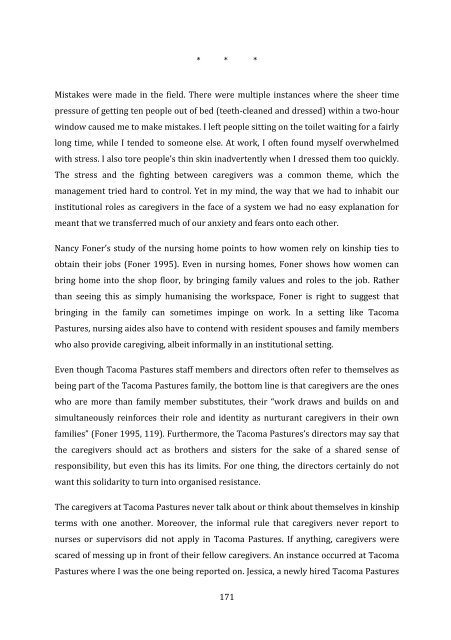Philip Y. Kao PhD thesis - Research@StAndrews:FullText
Philip Y. Kao PhD thesis - Research@StAndrews:FullText
Philip Y. Kao PhD thesis - Research@StAndrews:FullText
You also want an ePaper? Increase the reach of your titles
YUMPU automatically turns print PDFs into web optimized ePapers that Google loves.
* * *<br />
Mistakes were made in the field. There were multiple instances where the sheer time<br />
pressure of getting ten people out of bed (teeth-cleaned and dressed) within a two-hour<br />
window caused me to make mistakes. I left people sitting on the toilet waiting for a fairly<br />
long time, while I tended to someone else. At work, I often found myself overwhelmed<br />
with stress. I also tore people’s thin skin inadvertently when I dressed them too quickly.<br />
The stress and the fighting between caregivers was a common theme, which the<br />
management tried hard to control. Yet in my mind, the way that we had to inhabit our<br />
institutional roles as caregivers in the face of a system we had no easy explanation for<br />
meant that we transferred much of our anxiety and fears onto each other.<br />
Nancy Foner’s study of the nursing home points to how women rely on kinship ties to<br />
obtain their jobs (Foner 1995). Even in nursing homes, Foner shows how women can<br />
bring home into the shop floor, by bringing family values and roles to the job. Rather<br />
than seeing this as simply humanising the workspace, Foner is right to suggest that<br />
bringing in the family can sometimes impinge on work. In a setting like Tacoma<br />
Pastures, nursing aides also have to contend with resident spouses and family members<br />
who also provide caregiving, albeit informally in an institutional setting.<br />
Even though Tacoma Pastures staff members and directors often refer to themselves as<br />
being part of the Tacoma Pastures family, the bottom line is that caregivers are the ones<br />
who are more than family member substitutes, their “work draws and builds on and<br />
simultaneously reinforces their role and identity as nurturant caregivers in their own<br />
families” (Foner 1995, 119). Furthermore, the Tacoma Pastures’s directors may say that<br />
the caregivers should act as brothers and sisters for the sake of a shared sense of<br />
responsibility, but even this has its limits. For one thing, the directors certainly do not<br />
want this solidarity to turn into organised resistance.<br />
The caregivers at Tacoma Pastures never talk about or think about themselves in kinship<br />
terms with one another. Moreover, the informal rule that caregivers never report to<br />
nurses or supervisors did not apply in Tacoma Pastures. If anything, caregivers were<br />
scared of messing up in front of their fellow caregivers. An instance occurred at Tacoma<br />
Pastures where I was the one being reported on. Jessica, a newly hired Tacoma Pastures<br />
171
















